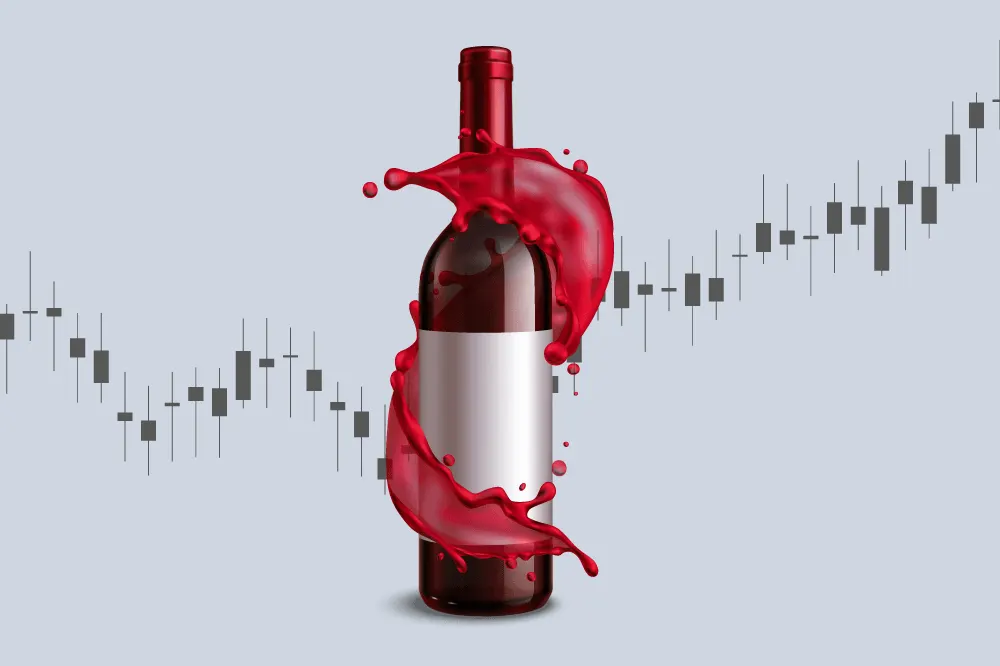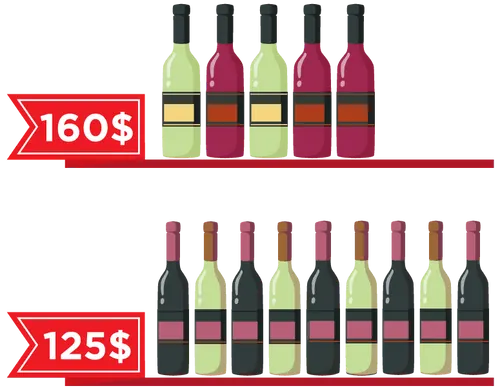Our partner, XM, lets you access a free demo account to apply your knowledge.
No hidden costs, no tricks.

Investing in alcohol, such as whisky or wine, has always been an elite hobby. This was not even a straightforward investment, but the elite bought and collected expensive wines for their enjoyment. But nowadays investing in wine, for pure investment, has become a trendy and easy process to do. There is no need for having an expert nose or being a skilled sommelier anymore, as you can judge wines based on other less la-di-da factors.
“Beer is made by men, wine by God.” - Martin Luther
Here we will take you through the whole process of investing in wines.

Before we start with our guide, we would like to present you with some of the most expensive wines ever sold.
This wine was sold at Sotheby’s auction in Hong Kong in 2010. Before the auction started, general toughs were that the three available bottles would sell for $30,000 each, but after fierce bidding, each bottle was sold for $230,000 to one collector for a grand total of $690,000
This bottle was salvaged from the shipwreck of a Swedish Freighter off the coast of Finland in 1989. This wine was sold at auction for $275,000. What is interesting about this wine is that taste and scarcity are not what give it its value, as there were around 2,000 bottles recovered. What gives value to this wine is that it was destined for Tsar Nicholas II of Russia but was struck by a German torpedo during World War I.
When we talk about expensive wines, we always think that they are really old. But it was not the case for the Screaming Eagle Cabernet Sauvignon 1992 six-litter bottle which was sold for $500,000 in 2000 at a Napa Valley charity auction.
This is the most expensive wine ever sold. The auction for this wine was held at Sotheby’s New York sale in 2018. There were only 600 bottles of Romanee-Conti 1945 ever made. A private Asian collector was the one who purchased it for the unbelievable price of $558,000. What's even more interesting is that one American collector paid $498,000 for the second bottle.
Every investment expert nowadays is talking about the importance of creating a portfolio and diversifying it. There are many different opportunities in the investment market and most of them have high volatility and depend on the performance of the economy and other similar factors. But wines do not fall into this category of asset, which makes them a great investment. One big advantage it holds over traditional investment assets such as stocks and bonds is that they are not dependent on a company's success. For example, if a company goes under, the value of its stock gets goes to zero. But if a wine producer goes out of business, the price of their wines appreciates.
“Wine has been strikingly good compared to other collectibles, while it doesn't provide the financial dividend of putting one's money in the stock market, it does perform better than gold, artworks, or postage stamps, or musical instruments, or government bonds, or treasury bills, or cash held in the bank” - Elroy Dimson
What determines the value of the wine is the vintage, place of origin, harvest yield, and consumer preference. All of these factors combined with supply and demand in order to determine the price of the wine. Because of this, wine prices are not affected by economic factors, which makes them a great addition to your portfolio.

When we are looking at wines that we want to invest in, we need to look at different factors. Some of these factors are fundamental, while others are market-driven and based on supply and demand. Below we will present some of these factors.
To put it simply, vintage is the year in which the grapes were harvested. But when looking at vintage, older does not automatically mean that it is better. One of the main aspects of wine quality is the quality of the grapes it was made from. This quality greatly depends on the weather conditions it was grown in, so if two wines were made using the same techniques and the same variety of grapes, it does not guarantee that they will taste the same if they were grown in different weather conditions. So when investing in wines, always conduct dedicated research about the vintage.

Not every wine ages the same way and for the same period of time. There are many different factors that determine the aging potential of a wine, such as grapes used, and acid level among others. We can also take a look at previously released wines from that producer and how they aged.
Most investment-grade wines tend to age for around 10 years. But there are also wines that age for longer periods of time, and with longer aging time their price and quality also increase.
So always do some research about the wine and vineyard it came from. How do their wines age? What are deciding factors in their aging process? When is it best to drink them? Etc.

Everything that is produced by big names in the industry will always sell for high prices. Wine is not an exception. The price of wine greatly depends on the producer and their status. Most of the investment-worthy wines come from leading producers, and it is unlikely that we will find wine produced by small unknown producers that will see much appreciation in value. There are some exceptions, and if the wine has some interesting history behind it, then the producer's name might not be a determining factor.

Wine price also greatly depends on the quantity available for purchase. There might be a wine that has every aforementioned factor but was produced in large quantities. This will cause prices to go down as more people will be able to purchase a bottle and won’t need to overpay in order to get their hands on them.
For example, there might be a producer who produces a small batch of wines that are really sought after. These wines tend to go for high prices and increase in value as time goes by.
Another factor to look at is the price history. We need to take a look at different wines produced by different producers and look at how their prices change as time goes on. This is not a short-lived task, and you need to keep an eye on auctions for around 6 months at least to get a better understanding of the market and decide which wine is best to purchase at that moment, as well as in the future.

Wine critic opinions are taken really seriously in the wine industry. Just a few words from a well-respected critic can have a huge impact on the price of a given wine. Because of this, always look at what critics are saying about the wine you have your eyes on before making an investment.
"..what is a wine worth? It's basically worth what you can afford to buy it for anywhere right now." - Mario Matavesco

Wines are sold on both first and secondary markets. Usually, wines that are sold on the primary market are not investment-grade wines and are wines we can access easily. Investment-grade wines are usually sold on secondary markets. There are many different auctions and exchanges where we are able to find those exclusive wines.
Auction houses that sell wines work just like auction houses for art. At these auctions, you will be able to find many different producers and wines which are available for purchase through auction.

These auctions always try to retain their prestigious status. Because of this, most of the wines which are sold here are of the highest quality. You can attend these auctions in person, online, or by phone.
This is the safest place to purchase wines, as every single wine sold here needs to pass the authentication process, and you won’t be tricked into buying a fake bottle.
Online auctions work in the same way as in-house auctions. But there are some differences. One advantage that online auctions have over traditional auction houses is that more people are able to access these auctions, as they are not restricted by geolocation. The selection of wines is usually more diverse in these auctions and there are more affordable options compared to auction houses, which sell the most exclusive wines in order to maintain their reputation.

Wine exchanges work in the same way as most other exchanges. Here exchanges connect people who want to sell wines and those who want to buy them. Here buyers and sellers reach an agreement and complete the transactions. The London International Vintners Exchange is one of the biggest wine exchanges in the world and has broken many different expensive wine sale records.

One of the biggest advantages that investing in wine has is the history of wine investments. It is not something new. They have been around for centuries and people were always ready to pay big money for them. There are also other advantages which we are going to mention below.
Investing in wine also comes with its disadvantages. Physical assets usually have some extra factors to keep in mind that traditional assets such as stocks do not have. So before investing in them, we need to know what awaits us.
The Liv-ex Fine Wine Index is a really great tool to utilize when deciding on which wine we should invest in. They have 3 major indices which we can use to analyze the market.
This index is used to track the daily price movement of Bordeaux First Growth. This index includes the ten most recent vintages of Margaux, Lafite Rothschild, Mouton Rothschild, and Haut Brion 2009-2018.
This index is a great benchmark for monitoring fine wine prices. This index tracks the price movement of the 100 most sought-after fine wines on the secondary market.
The Liv-ex Fine Wine 1000 index is the most comprehensive measure of the fine wine market. It tracks the price movement of 1000 wines and comprises seven sub-indices that represent the seven most traded wines in the world.
Our partner, XM, lets you access a free demo account to apply your knowledge.
No hidden costs, no tricks.
It depends on the wine. More exclusive wines with limited releases and scarce supply tend to go up in price over time. The producer is also a big determinant of the price and if it will go up or down.
Wines have a really good and strong history when it comes to keeping their value. If we select wines carefully, the risks that are associated with them will be lower than those associated with most traditional assets.
One of the biggest wine auction houses in the world is Sotheby’s Wine. They hold more than 20 auctions each year around the world. There are also auction houses such as Christie’s and Acker Merrall & Condit which are all considered market leaders.